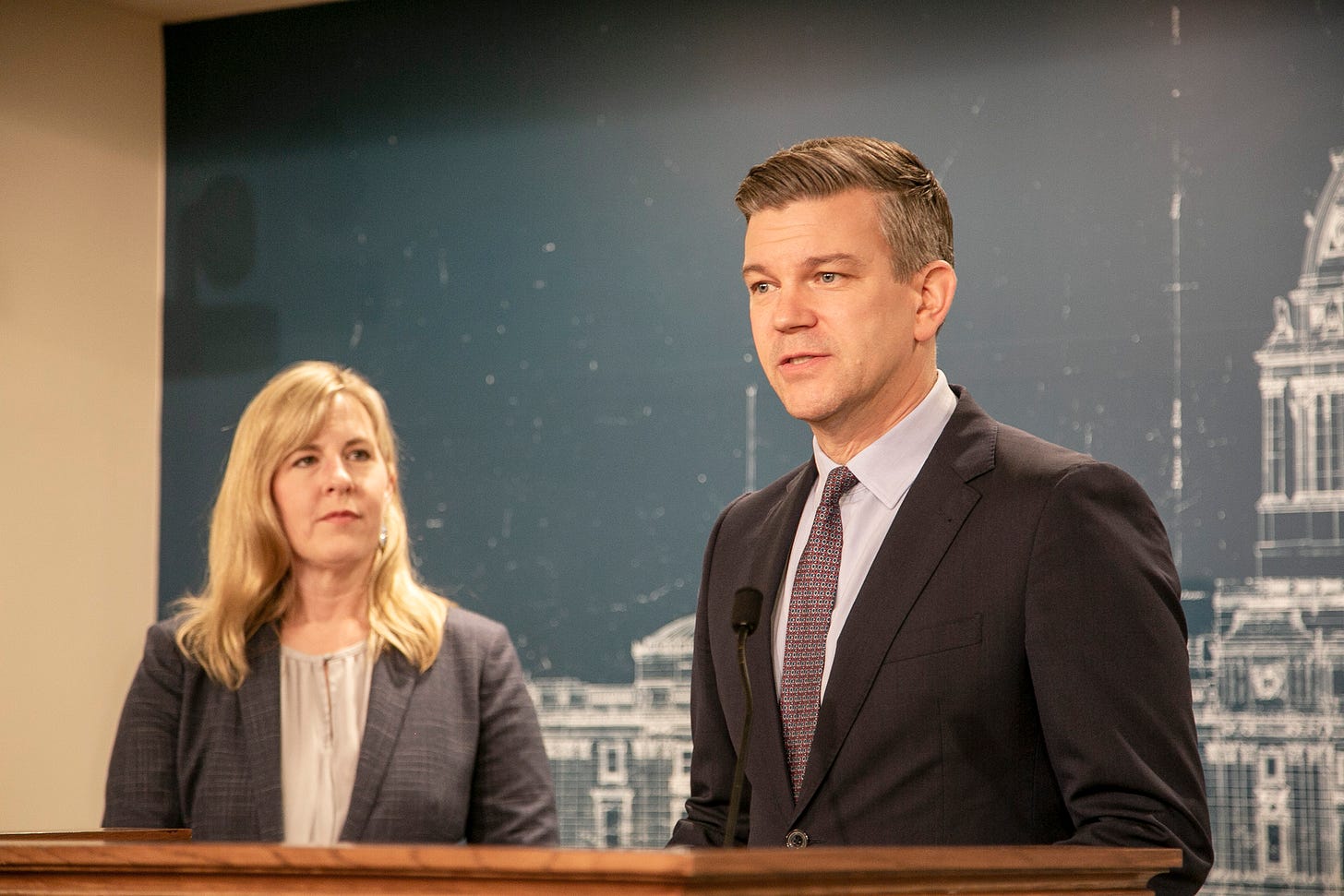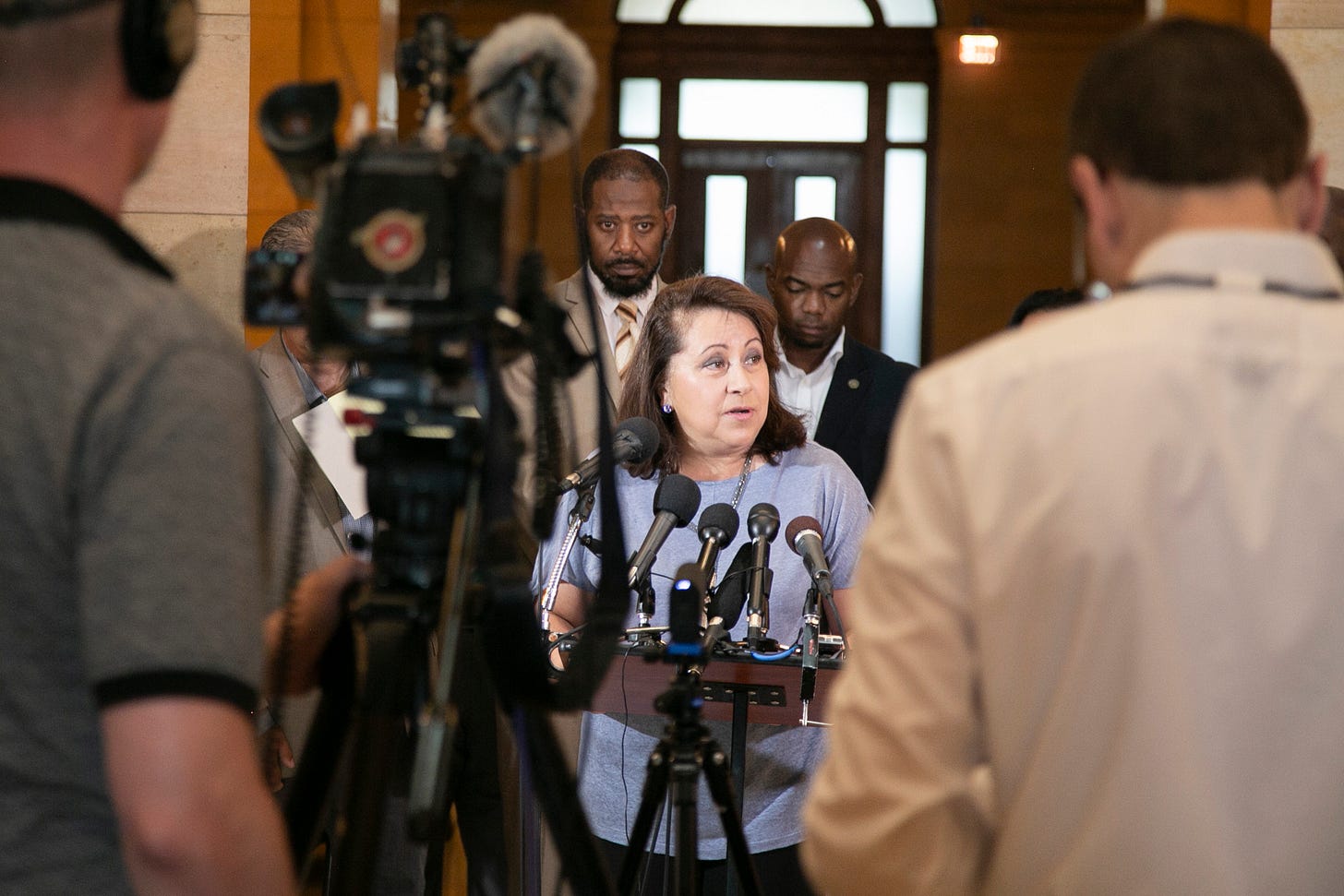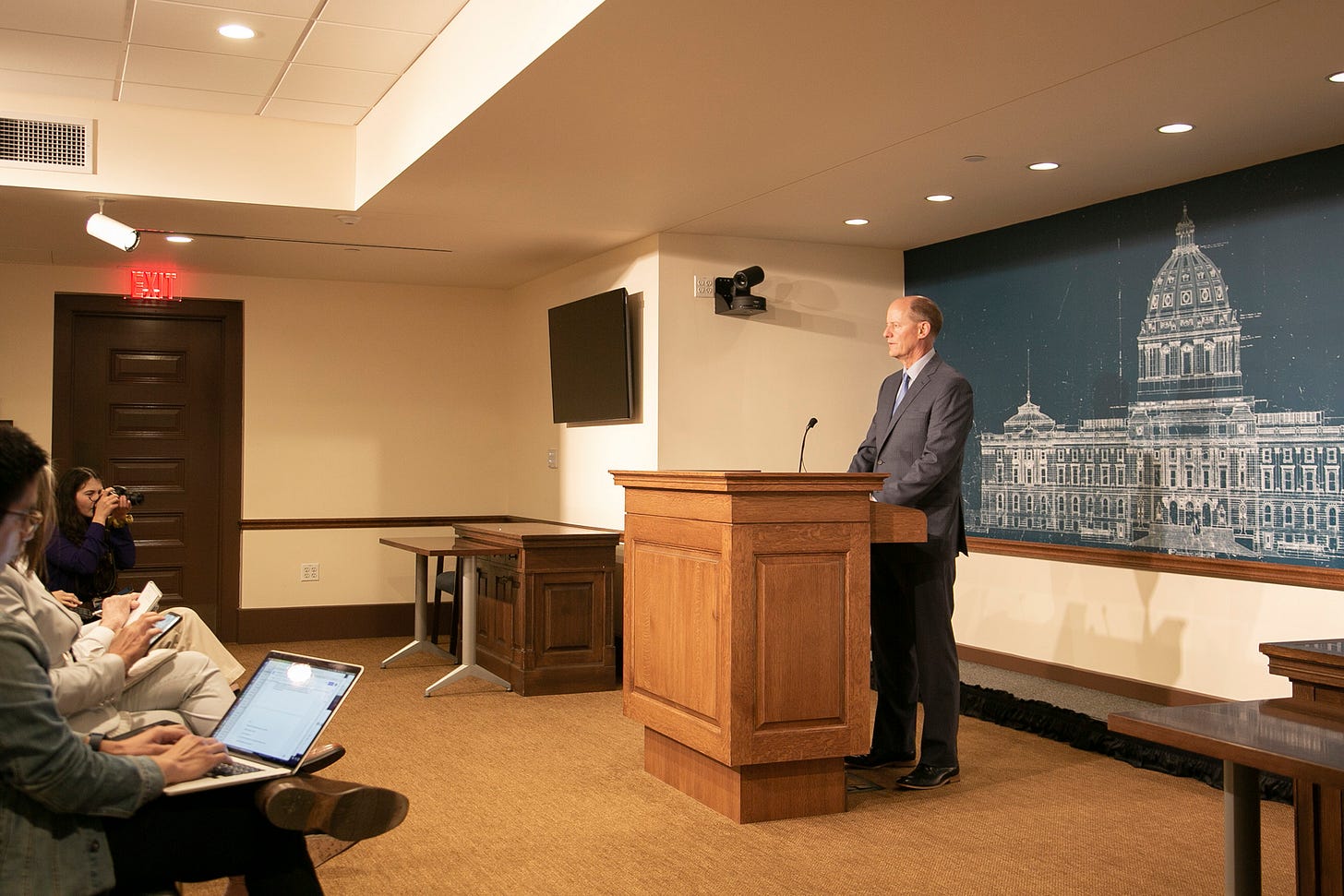So, about that public safety deal....
An after-action report on the special session's near derailment

It’s old news now, admittedly. But the question still seems worth asking, if for no other reason than it continues to haunt your author.
What the heck was that?
As June 29 melted into June 30 and a partial government shutdown deadline loomed at the Capitol, it suddenly looked as if a tripartite deal had magically sprung from the weeds. Indeed, House and Senate leaders acknowledge it came together quite late in the day.
The pact promised to save the special session from collapse, get a public safety/judiciary bill passed and even end the peacetime emergency—all with one mighty swoosh.
Then came the train wreck. Or, rather, we’ll borrow the phrase from Golden Valley’s DFL House Majority Leader Ryan Winkler: “The near train wreck.” The qualifier is appropriate enough; the deal, in fact, held together.
Still, for one desperate post-midnight hour, as weary media jackals wondered how long this crap would keep them from filing stories, it looked as if … let’s clean up Jim Morrison’s scatological metaphor here … the whole outhouse had gone up in flames.
Not everyone sees anything aberrant in all this. “It’s a sausage factory!” said Speaker Melissa Hortman, DFL-Brooklyn Park. “It always looks like that.”
Sadly, she has a point. But back to our story.

Hard words
The Senate public safety/judiciary floor debate on June 29 was relatively bruising. There were plenty of DFL attempts to graft police-reform measures into a compromise bill that had hardly any, and lots of recriminations from both political parties as those attempts were being made.
It looked bad for reformers when Sen. Warren Limmer, R-Maple Grove, the bill’s Senate author, urged rejection of a sign-and-release warrant measure that was a matter of considerable emotional heft to DFLers.
Under that proposal, police would issue court summons rather than jailing first-time offenders who miss court dates. Many felt that if it had been in statute earlier, it might have saved the life of Daunte Wright, a young Black man killed by a cop during a Brooklyn Center traffic stop.
But on the floor that day, Limmer opposed the idea. “It would weaken the police,” he said.
The Senate argued over the public safety bill for about six hours without taking action. It was then laid on the table to await a House vote on the same bill.
Stirred to rebellion
Over in the House that evening, expectations were high that DFL members of the People of Color and Indigenous (POCI) Caucus would fold into the House version a slew of police-reform amendments that had every potential for derailing the consensus bill then sitting on both floors.
They made those intentions plain during an impassioned Capitol Rotunda press conference on June 28. But in the end, most of the promised amendments—all of which were written up, posted and ready for introduction—never reached the floor.
In fact, just two changes were added in the House, in a deal that had Senate sign-off. The DFL sign-and-release measure was added, along with a GOP-authored addition to create misdemeanor and gross misdemeanor crimes for doxxing cops. The higher penalty kicks in if someone gets seriously hurt after an officer’s home address is shared online.
In the end, the public safety bill passed in the House 75-59. Several Republicans crossed over to vote with the Democrats, offsetting the few DFLers who strayed to the no column.
Hortman, speaking to the press on July 1, didn’t dispute claims that she lacked the votes to pass the bill as the sun rose on June 30. The sign-and-release warrant amendment, in addition to Gov. Tim Walz’s pledge to issue police-reform executive orders, convinced a critical mass of POCI Caucus members to vote for passage, she said.

“I think at least enough members of our caucus felt like they could look themselves in the mirror and say there was nothing more we could do,” Winkler agreed. “That is how this session played out in the end. We got all the bills passed and we could feel confident that there was nothing more we could get.”
After the House passed the public safety bill late on June 29, the stabilizing third leg of the agreement was brought forward.
It came when the House brought the state government bill to the floor. A Winkler amendment to that bill proposed an end to the peacetime emergency.
At first blush, it seemed as if Democrats might be acceding to a Senate demand made earlier in the special session, when Republicans amended an immediate end to the peacetime emergency into their state government bill.
But once House debate started on Winkler’s amendment, House Republicans were quickly stirred to rebellion. The DFL’s terms were not quite the same ones proffered by the Senate.
The Senate language ended the peacetime emergency at the moment of passage—even before signage by the governor. But Winkler’s amendment, timed almost to the instant with a press release from Walz proclaiming he was ending the emergency, didn’t wind things to a full stop until Aug. 1.
That was heartburn enough for the GOP. But Republicans also ruefully noted that Winkler’s amendment gave Walz’s administration flexibility to restart a peacetime emergency at any point. Still, Winkler’s amendment passed the DFL-led House and the legislation moved ahead.
Right about that time, the Senate restarted its public safety debate. It had planned to adopt and pass the House version, accepting the two new amendments. But the mood had grown noticeably icy. By fiddling with peacetime emergency’s concluding terms, DFLers had earned the ire of Senate leadership.
They decided to ditch the House language and take up their own version of public safety bill. The deal was off.
This was sometime well after midnight and it was now June 30. It appeared non-identical public safety bills would pass off the two floors. Time for conference committee hearings to reconcile differing versions was in extremely short supply. Yet a July 1 shutdown would leave courts, corrections and cops—if you’ll pardon the phrase—defunded.
At a fortuitous time, so it appears, the Senate decided to play the part of the cooling saucer. Senators paused debate, put the judiciary bill on ice and recessed. So did the House, which had already voted to reconsider the bill containing its alternative peacetime emergency amendment. Clearly, though out of public view, folks were chatting.
After an hour or so and without much explanation, the Senate returned, took up the amended House public safety bill language, and cheerfully passed it. The House, meanwhile, accepted the Senate’s immediate end to the peacetime emergency.
Crisis averted.

Not onboard
So back to that original question: What the heck was that?
During three press conferences last week, Session/Law asked Gazelka, Hortman and Walz in turn to offer their interpretation of events.
Gazelka pointed to the governor as a primary culprit for putting out his late-night press release. Senators were never onboard with extending powers to Aug. 1, Gazelka said. Beyond that, he said, GOP legislators found it hard to countenance the governor taking credit for ending the emergency when, in fact, the legislative branch made the decision.
“There was big frustration,” Gazelka said. “When he announced that he had the deal there, it was him moving to July 1, that just wasn’t accurate. So it caused a big uproar and we just had to work through it.”
When asked about his actions, Walz said he thought he had acted responsibly. He said his team that day secured assurances from the White House and U.S. Agriculture Secretary Tom Vilsack that emergency food relief would remain available to Minnesota, even without a peacetime emergency. So he felt comfortable ending the emergency.
“We had asked and put forward August 1 [as an end date] and the response was ‘nope,’” Walz said. “It has to be the first of July. So I worked to find a first of July fix and that's what we told them.”
True, largely. But it’s also true that the Walz proposal—which was mirrored in the House amendment—extended to Aug. 1 existing executive orders related to staff deployment and unemployment insurance regulations.
It also preserved Walz’s authority to “nimbly coordinate, allocate, distribute and manage COVID-19 vaccination and testing” while retaining Walz’s “authority to declare a new peacetime emergency as necessary.” That last clause, in particular, sent House Republicans into paroxysms.
The governor said he isn’t sure what the big deal was.
“I think it became semantics—you know, who was going to close this thing out,” Walz said. “I feel like we ran the marathon and they wanted to break the tape or something. But whatever it was, whatever was driving it, I was just glad it was over.”

And what of House Speaker Hortman? She sort of diplomatically splits the baby.
She stated clearly on July 1 that she doesn’t think Walz got in the way during those critical moments when a public safety/judiciary shutdown hung in the balance. She also reasserted their strong political alliance. “The governor is my partner and I think we are a fantastic negotiating team for Democrats,” she said. “Completely aligned.”
That said, she added, the GOP needed to a path to declare victory and she wanted to help them pave it. “Because otherwise,” she said, “we couldn’t get the best possible deal for Democrats.”
So there you go—the story of how the train wobbled but somehow stayed on the rails.
Sine ‘bye
The nearly month-long special session finally ended on July 7, after the Senate decided to hang around a few extra days to deal with some agency commissioner confirmations.
It left town Wednesday, with two officials confirmed, three appointments still up in the air and a sixth—MPCA Commissioner Laura Bishop—forced to resign so the Senate would lose the chance to fire her publicly.
But others have told that story, and much better, too, so we’ll leave off there.


